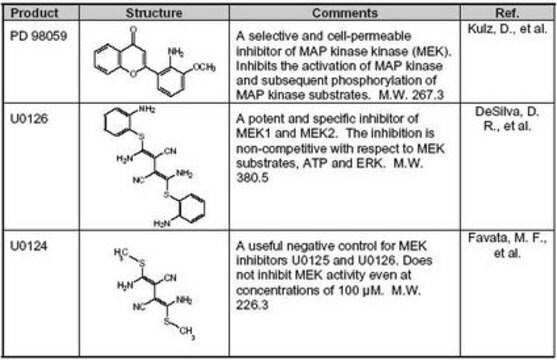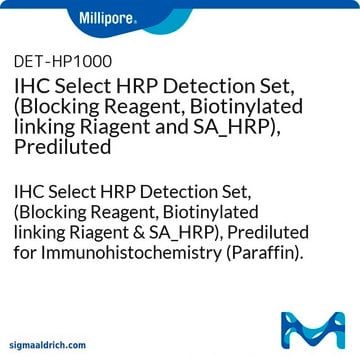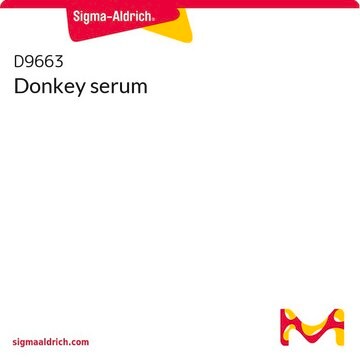444937
MEK Inhibitor I
The MEK Inhibitor I, also referenced under CAS 297744-42-4, controls the biological activity of MEK. This small molecule/inhibitor is primarily used for Phosphorylation & Dephosphorylation applications.
Synonym(s):
MEK Inhibitor I
Sign Into View Organizational & Contract Pricing
All Photos(1)
About This Item
Empirical Formula (Hill Notation):
C21H18N4OS
CAS Number:
Molecular Weight:
374.46
UNSPSC Code:
12352200
NACRES:
NA.77
Recommended Products
Quality Level
Assay
≥95% (sum of two isomers, HPLC)
form
solid
manufacturer/tradename
Calbiochem®
storage condition
OK to freeze
protect from light
color
white
solubility
DMSO: 10 mg/mL
methanol: 50 mg/mL
shipped in
wet ice
storage temp.
−20°C
General description
A cell-permeable pyridine-containing vinylogous cyanamide compound that acts as a potent and selective inhibitor of MEK (IC50 = 12 nM) with little activity towards MKK3 and MKK4 (IC50 >1 µM). The inhibition is noncompetitive with respect to ERK and the compound displays significant affinity only towards ATP-bound MEK (i.e. noncompetitive with respect to ATP). Exhibits superior potency, solubility, and stability compared to U0126 (Cat. No. 662005) in aqueous solutions. Shown to protect against phorbol ester-mediated ear edema in mice (ED50 of 5 mg/kg, ip.).
A cell-permeable, potent, and selective inhibitor of MEK (IC50 = 12 nM) with little activity towards MKK3 and MKK4 (IC50 >1 µM). The inhibition is non-competitive with respect to ERK and the compound displays significant affinity only towards ATP-bound MEK (i.e. non-competitive with respect to ATP). Exhibits superior potency, solubility, and stability compared to U0126 (Cat. No. 662005) in aqueous solutions. Shown to protect against phorbol ester-mediated ear edema in mice (ED50 of 5 mg/kg, ip.).
Biochem/physiol Actions
Cell permeable: yes
Primary Target
MEK
MEK
Product does not compete with ATP.
Reversible: no
Target IC50: 12 nM against MEK
Packaging
Packaged under inert gas
Warning
Toxicity: Standard Handling (A)
Reconstitution
Following reconstitution, aliquot and freeze (-20°C). Stock solutions are stable for up to 3 months at -20°C.
Other Notes
Wityak, J., et al. 2004. Bioorg. Med. Chem. Lett.14, 1483.
Legal Information
CALBIOCHEM is a registered trademark of Merck KGaA, Darmstadt, Germany
Storage Class Code
11 - Combustible Solids
WGK
WGK 1
Flash Point(F)
Not applicable
Flash Point(C)
Not applicable
Certificates of Analysis (COA)
Search for Certificates of Analysis (COA) by entering the products Lot/Batch Number. Lot and Batch Numbers can be found on a product’s label following the words ‘Lot’ or ‘Batch’.
Already Own This Product?
Find documentation for the products that you have recently purchased in the Document Library.
Gretchen M Argast et al.
Cells, tissues, organs, 193(1-2), 114-132 (2010-11-03)
Epithelial to mesenchymal transition (EMT) plays a dual role in tumor progression. It enhances metastasis of tumor cells by increasing invasive capacity and promoting survival, and it decreases tumor cell sensitivity to epithelial cell-targeting agents such as epithelial growth factor
Our team of scientists has experience in all areas of research including Life Science, Material Science, Chemical Synthesis, Chromatography, Analytical and many others.
Contact Technical Service







